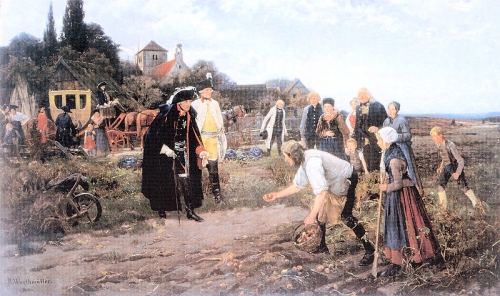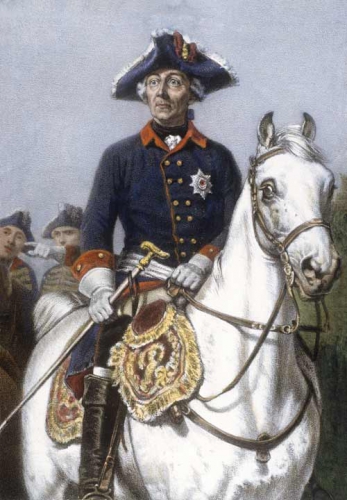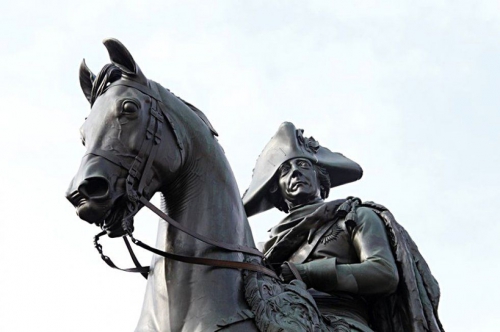Perhaps the most impressive Western tradition of statecraft, at least in the modern era, is that of Prussia. To be sure, the liberal-democratic tradition launched by the United States [2] and France is formidable, and it is not without reason that it today dominates our world. But the greatness of America and France also relied upon a prosaic factor: sheer demographic and geographic size. Little Prussia in contrast accomplished feats with absolutely miserable resources, raising herself up among the great powers and founding the German nation-state through sheer force of will. The Prussian “authoritarian” tradition, with its emphasis on hierarchy, community, and martial prowess, is then a useful counterpoise to the liberal-democratic one we take for granted today. Clausewitz and Carl Schmitt must be read beside Jefferson and Tocqueville [3].[1]
The most illustrious of all the Prussian leaders was Frederick the Great, a great political reformer and military commander who also cultivated a reputation as a philosophical thinker in his own right. Given how rare it is for generals and politicians to be particularly thoughtful, Frederick the Great merits all the more to be read by young Westerners in search of their heritage and a usable past. I propose then a reading of some of Frederick’s quite substantial philosophical and political writings.
Frederick’s Dissertation on the Reasons to Establish or Abrogate the Laws (Dissertation sur les raisons d’établir ou d’abroger les lois, 1750),[2] written after a decade in power and the hard-won conquest of Silesia, is admirably clear in its writing (how rare that can be!) and showcases wide reading and historical knowledge.[3] Many of Frederick’s themes and arguments retain all their relevance to this day. As this text is apparently unavailable in English, I will quote from it at length.[4] Unusually for a reigning monarch, the Dissertation was made public, thus showcasing the King’s philosophical credentials and stirring European debate.
Frederick’s ideal government is an enlightened patriarchy. He notes that “family fathers” have played an enormous role in the law throughout history, both as lawmakers and as legal masters of the household. For Frederick, the laws should serve to shape custom and enforce public morals, with the interests of the community overriding those of individuals. But this firm law must also be humane, rational, and moderate. Social conventions should be examined in this light and reformed accordingly. Frederick concludes with two proposals as examples: ending the stigma of bastardy, so as to prevent illegal abortions leading to the deaths of both the bastard and the mother, and a pan-European ban on dueling, the latter often causing the death of valuable citizens.
To know how to make laws, the practical Frederick advises looking to history:
Those who wish to acquire an exact knowledge of the way in which the laws must be established and abrogated can only look to history. We see there that all nations have had particular laws, that these laws were established in succession, and that much time has always been necessary for men to reach something reasonable. We see there that the legislators whose laws have lasted the longest are those who had as their goal public happiness, and who best knew the genius of the people whose government they regulated.
According to Frederick then, history teaches that the establishment of good laws requires patience, public-spiritedness, and harmony with “the genius of people,” which might also be termed national character. He shows an optimistic faith in reason typical of the Enlightenment: men require time to establish good laws, but once reached, these tend to spread. This accounts for the pervasiveness of Roman law: “These laws were found to be so admirable that after the destruction of the empire, they were embraced by the most civilized peoples.”
Frederick’s Dissertation provides a fairly impressive overview of the evolution of law from ancient to modern times, covering the Ancient Egyptians, Greeks, Romans and the modern European nations of England, France, and Germany. He draws from numerous sources, mentioned in the marginalia, including Herodotus, Plutarch, Livy, Cicero, and Tacitus for the Ancients and mainly French historians for the Moderns.
Frederick’s highlights from this enormous historical period are obviously not disinterested. These generally could be considered to subtly reinforce his position as an “enlightened despot” and pragmatic reformer, particularly interested in maximizing his state’s population and military power. In addition to “family fathers,” Frederick places a strong emphasis on the role of religion and, interestingly, usury in the development of the law. Hence, he expounds at length on Sparta, a martial state to which Prussia was often compared:
Lycurgus, king of Lacedaemon, used the laws of Minos, to which he added some of Osiris, which he collected himself from a journey he made to Egypt; he banished gold from his republic, silver, all sorts of currencies, and superfluous arts; he equally shared lands among the citizens.
This legislator, who intended to shape warriors, did not want any sort of passion to weaken their courage; he allowed for this effect the community of wives among citizens, which peopled the State, without excessively attaching private citizens to the sweet and tender bonds of marriage; all children were raised at public expense. When parents could prove that their children were born unhealthy, they were permitted to kill them. Lycurgus believed that a man who was not fit to bear arms did not deserve to live.
He ruled that helots, a kind of slave, would cultivate the soils, and that the Spartans would only busy themselves with the exercises which would render them fit for war.
The youth of both sexes wrestled; they exercised completely naked, in the public square.
Meals were regulated, where, without distinction of orders, all citizens ate together.
It was forbidden for foreigners to stay in Sparta, in order that their manners not corrupt those which Lycurgus had introduced.
Incompetent thieves were punished. Lycurgus had the intention of forming a military republic, and he succeeded in this.
The Aim of Law: Good Manners & Public Safety
 Frederick asserts that laws should aim to promote “[g]ood manners and public safety.” He is enormously concerned with civil peace, saying French chancellor Michel de l’Hôpital’s efforts to increase tolerance and defuse tensions between Catholics and Protestants during the Wars of Religion “worked for the salvation of the fatherland.” Laws may deal with politics (government), manners (criminal), and civil matters (contracts, usury).
Frederick asserts that laws should aim to promote “[g]ood manners and public safety.” He is enormously concerned with civil peace, saying French chancellor Michel de l’Hôpital’s efforts to increase tolerance and defuse tensions between Catholics and Protestants during the Wars of Religion “worked for the salvation of the fatherland.” Laws may deal with politics (government), manners (criminal), and civil matters (contracts, usury).
But for Frederick, laws do not merely have the negative goal of suppressing crime and instability, but also the positive one of fostering good habits. Hence the laws have an important cultural role. He says “the laws are dikes against the overflowing of vices, they must be made respected by the terror of punishments,” but these should also be humane. The sovereign must protect “the majesty of the laws” if these are to have any power. This sometimes fails. Under the Roman Republic “the corruption of manners . . . led to an endless multiplication of laws.”
Frederick cites the Twelve Tablets of Rome, inspired by Solon, among the best laws. These had notably legalized posthumous recognition of children (in cases where the alleged father died before birth) and divorce: “These laws, so equitable and so just, restrained citizens’ freedom only in the cases when their abuse of it could harm the calm of families and the security of the republic.”
However, in judging what individual liberty and equal rights citizens should have, Frederick stresses that the aim must always be the public good. Many restrictions on individual liberty and “discriminations” against classes of citizens might at first appear unjust, but are actually upon closer examination found to serve the general welfare. Frederick cites the German practice of primogeniture in this regard:
Whoever has bothered to the examine the laws with a philosophical spirit will have no doubt found many which at first appear contrary to natural equity, and which however are not so. I content myself with citing the right of primogeniture. It seems that nothing is more just than sharing the paternal estate equally among all children. However experience proves that the most powerful inheritances, subdivided into many parts, reduce over time opulent families to indigence; which has led father preferring to disinherit their younger sons rather than prepare their house for a guaranteed decadence. And for the same reason, laws which appear bothersome and harsh with certain individuals are not less wise, so long as they tend towards the entire society’s advantage; this is a whole to which the enlightened legislator will constantly sacrifice the parts.
Thus, discrimination against younger sons, while unfair for those concerned, can be justified by its strengthening of the continuity of the family house. (I note in passing that some have claimed this passing on of the family household to the first-born son has contributed to the strong German tradition of family businesses [the famous Mittelstand]. Conversely, the French Revolution’s egalitarian law of succession overrode the father’s will and equally distributed property among sons. Thus, estates tended to disintegrate over time. Some have blamed the catastrophic and lasting decline of French fertility in this period on these provisions, bourgeois fathers seeking to reduce their offspring to maintain their households.)
Certainly the American and French revolutionaries would not deny the importance of the general welfare, but Frederick is more explicit: the public good must come before the individual interest and narrow “rights.” In this he echoes the wisdom of classical philosophy, as when the Roman emperor and Stoic philosopher Marcus Aurelius [4] wrote: “What brings no benefit to the hive brings none to the bee. [. . .] What causes no harm to the city causes no harm to the citizen.”

Patriarchy: A Realistic Ideal
Frederick ascribes an enormous role to the père de famille, the family father, both in the historical foundation of law and in establishing good laws in the present. He begins his historical account as follows:
It seems probably that family fathers were the first legislators: the need to establish order in their houses no doubt forced them to make domestic laws. Since these first times, and when men began to assemble in cities, the laws of these particular jurisdictions were found to be inadequate for a more numerous society. [. . .]
Disorders accrued in the cities, news vices were born, and the family fathers, as those with the greatest interest in repressing them, agreed, for their security, to oppose this excess.
Towards his conclusion, Frederick presents patriarchy as one of the best forms of government given humanity’s imperfect nature. He describes first a utopia in which government and laws would perfectly regulate society like clockwork:
A body of perfect laws would be the masterpiece of the human spirit concerning the government’s policy: one would observe there a unity of plan and rules so exact and proportioned, that a State driven by these laws would resemble a watch, whose springs have been made for one same goal; one would find there a deep knowledge of the human heart and the genius of the nation; punishments would be tempered, so that by maintained good manners, they would be neither light nor harsh, clear and precise rulings would never lead to legal dispute; they would consist in an exquisite choice of all that has been best in civil laws, and in an ingenious and simple application of these laws to the customs of the nation; all would be foreseen, all would be combined, and nothing would be subject to inconveniences: but perfect things do not pertain to humanity.
Human beings being imperfect, Frederick instead offers patriarchy as a realistic regime. Under patriarchy, the government’s public-spiritedness is ensured by a sense of family belonging with the people:
The peoples would have reason to be satisfied, if legislators placed themselves in their regard in the same mental dispositions of these family fathers who gave the first laws: they loved their children; the maxims they prescribed had as their goal only the happiness of their family.
This perspective largely resonates with evolutionary psychology’s later view that feelings of kinship enable in-group altruism and more generally on the centrality of family to human psychology.
Frederick highlights numerous examples throughout history of the importance of the father in law: parricide was so unthinkable to Solon he made no mention of it in his laws, while the Romans made the mere intention of parricide punishable by death. This did not mean the father should enjoy unlimited and tyrannical power, as Frederick also writes:
No laws revolts humanity more than this right of life and death which fathers had over their children in Sparta and Rome. In Greece, a father who was too poor to provide for the needs of a too numerous family allowed the children born in excess to perish; in Sparta and in Rome, if a child came to the world poorly-shaped, this sufficiently authorized the father to deprive him of his life.
It is worth observing here that if the killing of infants was not for an arbitrary individual purpose such as a father’s whim, but rather for a rational public purpose such as eugenics, this might meet Frederick’s criteria for a good law, given his previous assertion of the public good over individual interest.
 Frederick’s advocacy of paternal authority is all the more poignant and significant in that his own father, Frederick-William, also known as the Soldier King, had been a harsh one. Frederick-William had often beaten his son and executed before Frederick’s eyes his youthful best friend (and possible lover), Hans von Katte, for “desertion.”
Frederick’s advocacy of paternal authority is all the more poignant and significant in that his own father, Frederick-William, also known as the Soldier King, had been a harsh one. Frederick-William had often beaten his son and executed before Frederick’s eyes his youthful best friend (and possible lover), Hans von Katte, for “desertion.”
Undivided Authority
Frederick’s apology of patriarchy fits well with his arguing that the sovereign should enjoy undivided authority, free notably from parliaments. This enabled the sovereign to concentrate without distraction and formulate coherent laws. Coming from an absolute monarch, this was obviously not a disinterested position, but it was forcefully argued. Frederick stresses the dissensions between Senate and people which paralyzed the Roman Republic and writes on England:
Although England has many wise laws, it is perhaps the European country where they are the least in effect. Rapin Thoyras [a French historian] remarks very well that, by a vice of government, the power of the King is constantly in opposition to that of the parliament; that they watch each other, either to conserve their authority, or to extend it; which distracts the King and the representatives of the nation from the care which they should expend to maintain justice; and this turbulent and stormy government changes endlessly its laws by acts of parliament, according to whether the current situation and events forces it to do so; hence It follows that England is in the situation of more requiring reform of its jurisprudence than any other kingdom.
Frederick argues elsewhere that laws made by different authors will tend to contradict one another and be incoherent:
When in a State the laws are not assembled in a single body, there must be some who contradict each other; as they are the work of different legislators who did not work on the same scheme, they will lack unity which is so essential and so necessary to all important things.
He notes that nothing is worse for respect for the laws than internal contradiction. Hence, Frederick strongly argues for legal codification, citing many examples, from Justinian through Alfred the Great to Louis IX of France.
Frederick then explicitly rejects any doctrine of divided sovereignty or separation between executive and legislative authority, as found in the writings of Montesquieu and the American Constitution. No doubt Frederick would not be surprised by the often vague and incoherent texts produced by divided sovereigns, whether the representatives in the U.S. Congress or the heads of state of European summits.
To be continued . . .
Notes
1. My ability to directly study the Prussian tradition is sharply limited by my very inadequate knowledge of German. Concerning Frederick however, I am fortunate, as a blessed son of France, for the Great King wrote overwhelmingly in French. This reflected the preeminence of French as the European lingua franca of the eighteenth century and Frederick’s enthusiastic embrace of the French Enlightenment, or les Lumières. On other benefits of learning the French language, see Guillaume Durocher, “Learning French with Jean-Marie Le Pen,” [5] Counter-Currents, November 20, 2015.
2. As published in Johann Preuss, Œuvres de Frédéric le Grand, vol. 9 (Berlin: Royal Printer, 1848). http://friedrich.uni-trier.de/fr/oeuvres/9/toc/ [6]
3. Montesquieu is a possible but uncertain influence. Frederick makes clear in a letter that he had read Montesquieu’s Considerations on the Greatness and Decadence of the Romans. However, there is no mention of the French writer’s more famous Spirit of the Laws, which were published around the same time as the Dissertation’s writing. There is confirmation that Frederick read the Spirit of the Laws afterwards. Anne Baillot and Brunhilde Wehinger note a number of parallels: on the law as representing the progressive development of human reason (Montesquieu: “The law, in general, is human reason.”), on the need to adapt law to “national genius” and circumstances, on a gentle approach to abortion, and in supporting the ban of torture. Anne Baillot and Brunilde Wehinger, “Frédéric II, Roi-philosophe et législateur,” HAL.archive-ouvertes.fr (2013). https://hal.archives-ouvertes.fr/hal-00788671/document [7]
4. Frederick’s works appears to be largely unavailable online in English. French and German versions of his complete works are available in scanned and text formats from the University of Trier. However, these are only available page-by-page rather than by chapter or book, which make referencing somewhat obnoxious.





 del.icio.us
del.icio.us
 Digg
Digg
Les commentaires sont fermés.